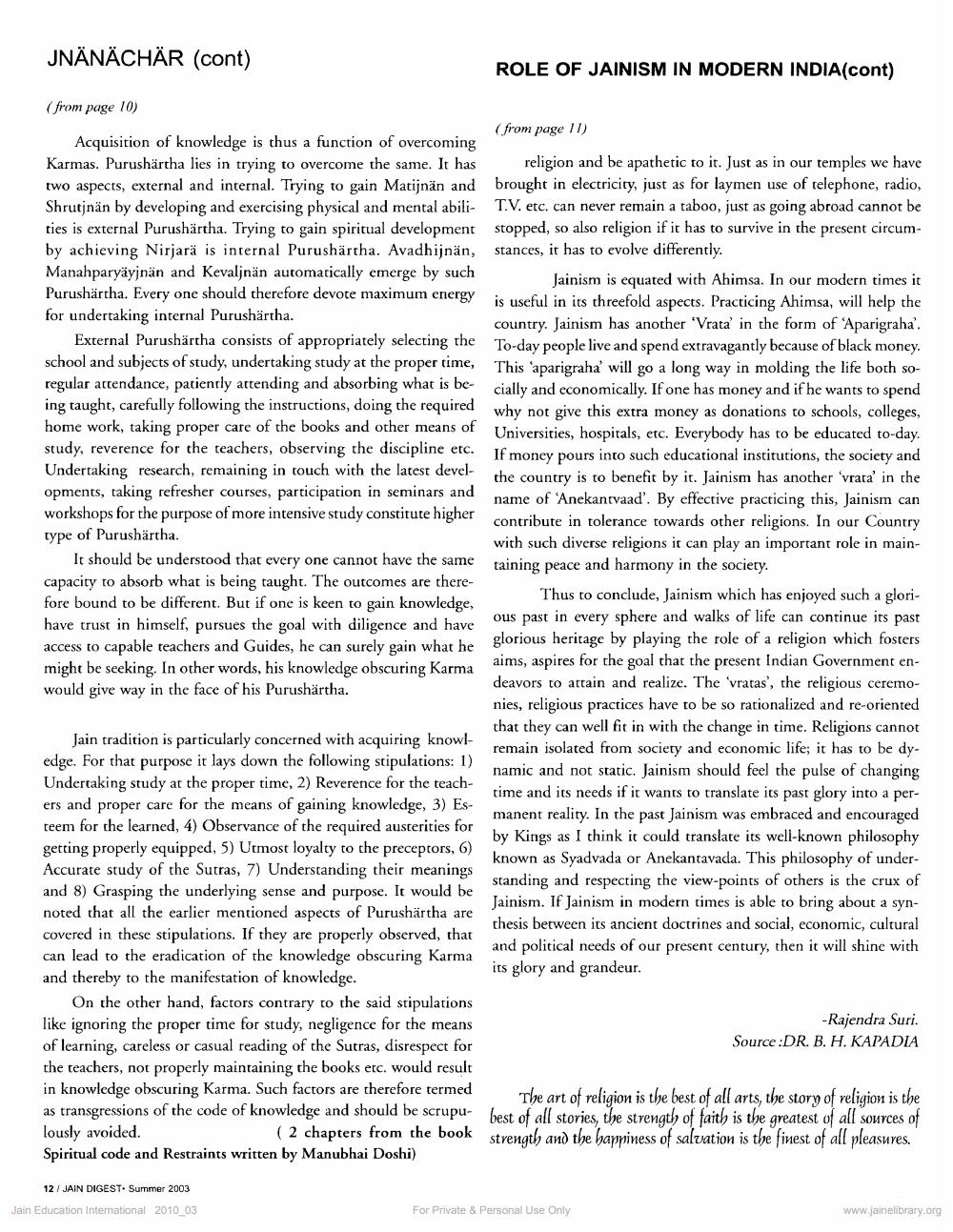________________
JNÄNÄCHÄR (cont)
(from page 10)
Acquisition of knowledge is thus a function of overcoming Karmas. Purushärtha lies in trying to overcome the same. It has two aspects, external and internal. Trying to gain Matijnän and Shrutjnän by developing and exercising physical and mental abilities is external Purushärtha. Trying to gain spiritual development by achieving Nirjarä is internal Purushärtha. Avadhijnän, Manahparyäyjnän and Kevaljnän automatically emerge by such Purushärtha. Every one should therefore devote maximum energy for undertaking internal Purushärtha.
External Purushärtha consists of appropriately selecting the school and subjects of study, undertaking study at the proper time, regular attendance, patiently attending and absorbing what is being taught, carefully following the instructions, doing the required home work, taking proper care of the books and other means of study, reverence for the teachers, observing the discipline etc. Undertaking research, remaining in touch with the latest developments, taking refresher courses, participation in seminars and workshops for the purpose of more intensive study constitute higher type of Purushärtha.
It should be understood that every one cannot have the same capacity to absorb what is being taught. The outcomes are therefore bound to be different. But if one is keen to gain knowledge, have trust in himself, pursues the goal with diligence and have access to capable teachers and Guides, he can surely gain what he might be seeking. In other words, his knowledge obscuring Karma would give way in the face of his Purushärtha.
Jain tradition is particularly concerned with acquiring knowledge. For that purpose it lays down the following stipulations: 1) Undertaking study at the proper time, 2) Reverence for the teachers and proper care for the means of gaining knowledge, 3) Esteem for the learned, 4) Observance of the required austerities for getting properly equipped, 5) Utmost loyalty to the preceptors, 6) Accurate study of the Sutras, 7) Understanding their meanings and 8) Grasping the underlying sense and purpose. It would be noted that all the earlier mentioned aspects of Purushärtha are covered in these stipulations. If they are properly observed, that can lead to the eradication of the knowledge obscuring Karma and thereby to the manifestation of knowledge.
On the other hand, factors contrary to the said stipulations like ignoring the proper time for study, negligence for the means of learning, careless or casual reading of the Sutras, disrespect for the teachers, not properly maintaining the books etc. would result in knowledge obscuring Karma. Such factors are therefore termed as transgressions of the code of knowledge and should be scrupulously avoided. (2 chapters from the book Spiritual code and Restraints written by Manubhai Doshi)
12 / JAIN DIGEST. Summer 2003
Jain Education Intemational 2010_03
ROLE OF JAINISM IN MODERN INDIA(cont)
(from page 11)
religion and be apathetic to it. Just as in our temples we have brought in electricity, just as for laymen use of telephone, radio, T.V. etc. can never remain a taboo, just as going abroad cannot be stopped, so also religion if it has to survive in the present circumstances, it has to evolve differently.
Jainism is equated with Ahimsa. In our modern times it is useful in its threefold aspects. Practicing Ahimsa, will help the country. Jainism has another 'Vrata' in the form of 'Aparigraha'. To-day people live and spend extravagantly because of black money. This 'aparigraha' will go a long way in molding the life both socially and economically. If one has money and if he wants to spend why not give this extra money as donations to schools, colleges, Universities, hospitals, etc. Everybody has to be educated to-day. If money pours into such educational institutions, the society and the country is to benefit by it. Jainism has another 'vrata' in the name of 'Anekantvaad'. By effective practicing this, Jainism can contribute in tolerance towards other religions. In our Country with such diverse religions it can play an important role in maintaining peace and harmony in the society.
Thus to conclude, Jainism which has enjoyed such a glori
ous past in every sphere and walks of life can continue its past glorious heritage by playing the role of a religion which fosters aims, aspires for the goal that the present Indian Government endeavors to attain and realize. The 'vratas', the religious ceremonies, religious practices have to be so rationalized and re-oriented that they can well fit in with the change in time. Religions cannot remain isolated from society and economic life; it has to be dynamic and not static. Jainism should feel the pulse of changing time and its needs if it wants to translate its past glory into a permanent reality. In the past Jainism was embraced and encouraged by Kings as I think it could translate its well-known philosophy known as Syadvada or Anekantavada. This philosophy of under
standing and respecting the view-points of others is the crux of Jainism. If Jainism in modern times is able to bring about a syn
thesis between its ancient doctrines and social, economic, cultural and political needs of our present century, then it will shine with its glory and grandeur.
-Rajendra Suri. Source:DR. B. H. KAPADIA
The art of religion is the best of all arts, the story of religion is the best of all stories, the strength of faith is the greatest of all sources of strength and the happiness of saltation is the finest of all pleasures
For Private & Personal Use Only
www.jainelibrary.org




